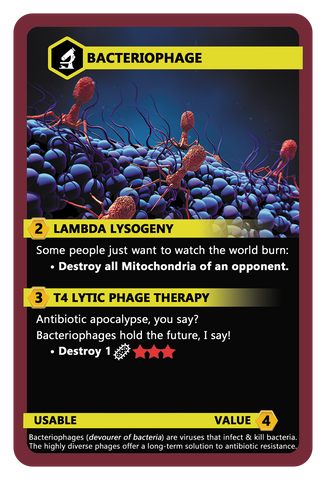In the microscopic battleground where bacteria rule, a silent assassin lurks: the Bacteriophage. As antibiotic resistance threatens our world, understanding this bacterial hitman becomes crucial. Dive deep into our guide, where we unveil the top 5 fascinating facts about bacteriophages, debunking myths and answering your pressing questions.
With a concoction of accurate information and strategic gameplay insights from ImmunoWars, we're here to equip you with knowledge, preparing you for both real-world microbial wars and virtual battles. Ready to uncover the secrets of the Bacteriophage and strategize your next move in ImmunoWars? Mr. White and Mr. Black are eager to see your play. Let's get started.

Top 5 Fascinating Facts About Bacteriophages You Don't Know
Bacteriophage Structures
Bacteriophages, being viruses, are composed of nucleic acids (either DNA or RNA) encased within a protein shell. Some bacteriophages also possess a protein tail, with tail fibers extending from it. These tail fibers aid the phage in attaching to its bacterial host, while the tail facilitates the injection of viral genes into the host.
Genome Packing Mystery
Ever wondered how viruses cram their extensive genetic material into their tiny capsids? While RNA viruses have a unique self-folding mechanism to fit their genome within the capsid, DNA viruses employ specialized enzymes, known as packing enzymes, to achieve this feat.
Dual Life Cycles
Bacteriophages can reproduce through two distinct life cycles: lysogenic and lytic. In the lysogenic cycle, the host remains alive as the viral genes integrate into the bacterial chromosome. In contrast, the lytic cycle sees the host's demise as newly replicated viruses burst out, destroying the host cell in the process.
Gene Transfer Agents
Bacteriophages play a pivotal role in transferring genes between bacteria through a process called transduction. This can occur during both the lytic and lysogenic cycles. For instance, during the lytic cycle, bacterial DNA might accidentally get enclosed within a viral capsid. When this phage infects another bacterium, it introduces the DNA from the previous bacterium, facilitating gene transfer.
Turning Harmless Bacteria Deadly
Bacteriophages can transform benign bacteria into disease-causing agents. Certain bacteria species, including E. coli and Streptococcus pyogenes, become pathogenic when they acquire genes producing toxic substances via bacteriophages. These modified bacteria can then cause diseases in humans, ranging from food poisoning to more severe conditions.
Bacteriophages in ImmunoWars
In the high-tech realm of ImmunoWars, the Bacteriophage Card stands out as a cutting-edge tool in your arsenal. This technology card, categorized under "usable," is equipped with dual abilities that can turn the tide of any battle.


The Bacteriophage Card's Abilities
Card category: Usable
Lambda Lysogeny:
Some people just want to watch the world burn: With this ability, you can obliterate all Mitochondria of an opponent. But remember, such power comes at a price, costing you 2 ATP.
T4 Lytic Phage Therapy:
Antibiotic apocalypse, you say? Bacteriophages hold the future, I say: This ability allows you to annihilate 1 bacteria of 3 stars severity, ensuring you have the upper hand against bacterial threats.
But that's not all. If you ever find yourself in need of ATP, this card can be traded in the ImmunoWars market for a whopping 4 ATP. Whether you use it for its abilities or trade it for energy, the Bacteriophage Card is a valuable asset in your ImmunoWars deck.
FAQ
What is the Bacteriophage Card in ImmunoWars?
The Bacteriophage Card symbolizes nature's bacterial hitman, offering protection against specific bacterial adversaries. The card has two abilities: you can obliterate all Mitochondria of an opponent or you can annihilate 1 bacteria of 3 stars severity.
How do bacteriophages function?
Bacteriophages infect and annihilate specific bacteria by injecting their genetic material and commandeering the bacteria's machinery to reproduce.
Are bacteriophages safe for humans?
Absolutely. Bacteriophages target only bacteria and cannot infect human cells.
Can bacteriophages be an alternative to antibiotics?
They offer a promising alternative, especially as antibiotic-resistant bacterial strains become more prevalent. Bacteriophages provide targeted action, preserving beneficial bacteria while eliminating the harmful ones.
Conclusion
In an era where antibiotic resistance is a looming threat, the Bacteriophage emerges as a beacon of hope. But, as with everything in ImmunoWars, there's a twist. While they offer a potent weapon against bacterial adversaries, the ever-mysterious Mr. Black is always plotting a countermove. ImmunoWars isn't just a game; it mirrors the real-world microbial confrontations. By merging entertainment with education, ImmunoWars seeks to empower its players with knowledge, dispelling myths and fostering informed decisions. Ready to delve into the shadows and confront the microbial world? Join the mission and play ImmunoWars today!


